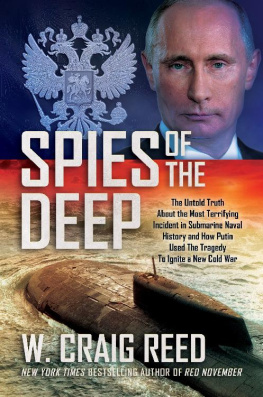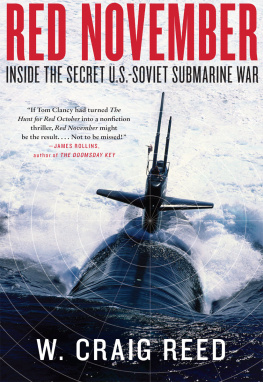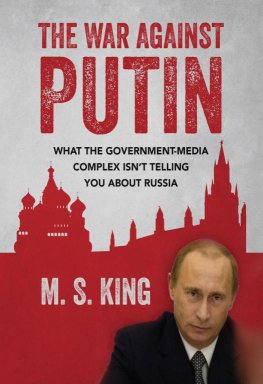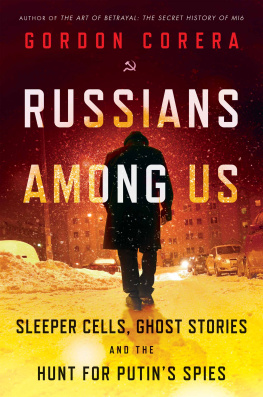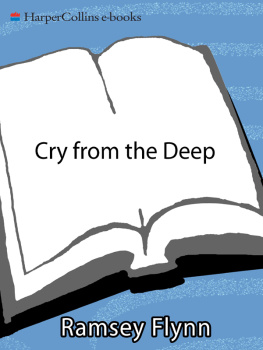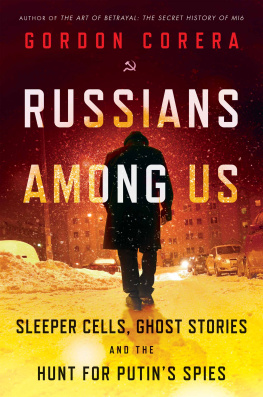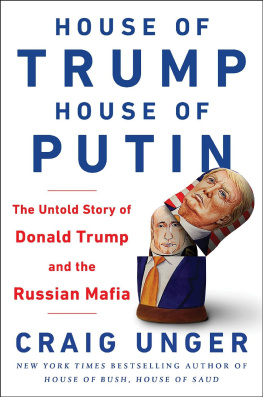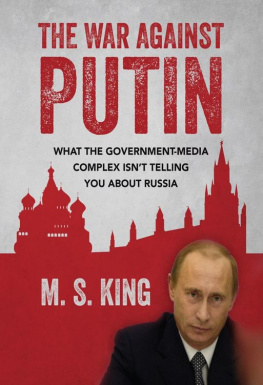


The Untold Truth
About the Most Terrifying Incident
in Submarine Naval History
and How Putin Used The Tragedy
To Ignite a New Cold War


CHAPTER 6
PRELUDE TO A TRAGEDY
[I]t was very dicey at times when we had to weave around obstacles or dive quickly to avoid slamming into an iceberg.
TOM KUNZ,
Petty Officer, USS Memphis
V ladimir Putin was never destined to be a ruthless world leader. He was born into the Leningrad home of Vladimir Spiridonovich Putin and Maria Ivanovna Putina on October 7, 1952. Maria worked in a factory, and Vlad Sr. was a diesel submariner in the Soviet Navy. Putin Jr. was by no means a silver-spooner, and endured a humble and difficult life in a communal apartment in Leningrad. Putins meager beginnings allowed him to understand well what it means to lack lifes basic necessities, including adequate food, water, shelter, and gas for heat.
Young Putin was a strong-headed and rowdy boy. By the time he reached the fifth grade, his defiant behavior denied him membership into the coveted Pioneers organization at his school. He found a release for his anger by learning how to take down opponents in the boxing ring. He then traded his gloves for judo and karate belts, and eventually won his citys sambo championship by beating the reigning world judo champ.
When Putin turned sixteen, he imagined himself as a KGB officer on exciting undercover assignments. He set up a meeting with the KGB directorate to find out what it might take to join their ranks, and was told to get a law degree and never call them again. He acted on the advice, signed up for law school in Leningrad in 1970, and graduated five years later. He did not contact the KGB. Instead, they recruited him in 1975, and at the age of twenty-two, he was finally living his boyhood dream.
Putin completed his training as a KGB officer and was eventually recruited by the first chief directorate to monitor U.S. and other foreigners in Leningrad. He later accepted an undercover assignment as a translator and an interpreter at the KGB station in Germany. Part of his job entailed recruiting other undercover agents to become spies stationed in the United States.
Putin ended his KGB career in 1991 after attaining the rank of lieutenant colonel. He was then selected as the head of the Committee for External Relations in Saint Petersburg, where he was responsible for promoting international relations and foreign investments. During that time, he became embroiled in a ninety-three-million-dollar foreign aid scandal, but his cunning allowed him to avoid losing his job. Instead, he effectively got a raise by employing strong negotiating skills to maneuver his way into various promotions within the government at Saint Petersburg.
President Boris Yeltsin appointed Putin deputy chief of presidential staff in March 1997. Yeltsin later made him head of the FSB. In 1999, a decade had passed since the collapse of the Berlin Wall, but that historic event had done little to dampen global fear and paranoia. That same year, Putin watched the wind fall from Russias sails as Yeltsin was embarrassed on the world stage by NATO. Objections voiced by the ailing president over the U.S.-instigated bombing of Yugoslavia in March 1999 had been brushed aside like the buzzing of an insignificant fly. Defense ministry general Leonid Ivashov uttered what every Russian believed: NATO is an agent of war, not peace. It is a criminal organization that does not have the right to exist.
Having served as a KGB colonel, Putin used the public anger over Russias fall from grace to propel his rise to power. He campaigned as a pro-military leader with a plan to breathe new life into Russias withering war machine. As the son of a proud Soviet submariner, Putin proclaimed that the Navy should not be treated like a poor relative.
Yeltsins health and public image continued to decline as the president engaged equally with vodka and corruption. He propelled Putin into the position of acting prime minister of the government of the Russian Federation and announced that he wanted the former KGB officer to be his successor. Putin then declared his decision to run for the presidency. His odds of winning did not look good. On August 16, 1999, the State Duma approved Putin as the prime minister of Russia, but an election poll taken that month gave him less than 2 percent of the votes for president. Little did he know that the captain of a Russian submarine would change the course of history by helping to propel him to power.
In late August 1999, Captain Gennady Lyachin and his crew aboard the Kursk embarked on a two-and-a-half-month voyage to secretly traverse the coastlines near England and Norway and glide undetected through the Strait of Gibraltar. The Kursk an Oscar II class killer submarinewas longer than a football stadium and taller than an eight-story building. The massive behemoth was one of ten submarines of the Ante -class and carried twenty-four Granit nuclear missiles, each with warheads containing forty times the explosive power of the bombs dropped on Japan during World War II. The subs double hull made the vessel nearly impossible to sink, even after a direct hit by a U.S. MK-48 ADCAP torpedo.
During his mission, Lyachin inched up the attack periscope to spy on ships traversing the Mediterranean. An anxious circle of officers crowded around the periscope stand as their captain turned the metal cylinder left and right and flipped from low to high power. Lyachin removed his eye, smiled, and cupped his hands near the eyepiece to reflect golden sunlight off a nearby fire control panel. The officers let out a chorus of oohs and aahs at the sight. Later that day, in the Adriatic Sea near Yugoslavia, with a tense hush permeating the GKP, Lyachin ordered his crew to close in tight on the aircraft carrier USS Theodore Roosevelt . The space was rigged for ultraquiet, and with all unnecessary systems turned down or off, all clanking and chatting ceased. With orders issued in hushed whispers, the Kursk s fire control party gained an accurate firing solution for its Shipwreck missiles.
Lyachin swiveled the periscope cameras upward and beamed the images via closed-circuit video to televisions in the GKP and crews mess. The crew gasped as images of the aircraft carriers massive hull came into view. The ships huge propellers pounded the ocean with fury as its aircraft screamed from the deck to complete missions over Yugoslavia.
In the control room of the Roosevelt , officers were alerted by sonar operators that a predator had been detected. Nine P-3 Orion ASW aircraft were spun up and sent on the hunt. They occasionally got a sniff of the Kursk but could not keep an accurate track. When they were finally able to close in, Lyachin reluctantly ordered his sub to leave the area. Filled with mixed emotions, he both fretted and smiled. He was disappointed hed been chased away, but he was ecstatic hed proven to the West that the Russian Navy was still a formidable adversary. NATO had been sent a sobering message: a Russian submarine had easily slipped through its defenses and obtained a firing solution. At any time, the Kursk could have launched its missiles and obliterated the Roosevelt .
Next page
